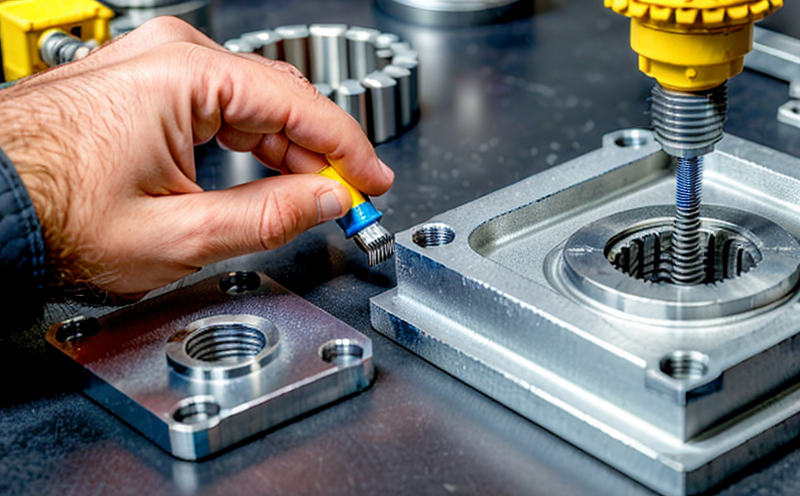Testing for the mechanical integrity of small parts to ensure they withstand regular use without breaking
Ensuring the Reliability of Small Parts Why Testing for Mechanical Integrity Matters
In todays fast-paced industrial landscape, manufacturers and suppliers are under constant pressure to deliver high-quality products that meet demanding specifications. One critical aspect of product development is ensuring the mechanical integrity of small parts, which often go unnoticed until they fail under regular use. This can lead to costly downtime, reputational damage, and even physical harm to people.
At Eurolab, we specialize in providing laboratory services that cater specifically to this need. Our Testing for Mechanical Integrity of Small Parts service helps businesses ensure their products can withstand the rigors of daily operation without breaking or malfunctioning. In this article, well delve into the importance of testing small parts, highlight the advantages of using our service, and provide answers to common questions.
Why is Testing for Mechanical Integrity Essential?
In todays competitive marketplace, manufacturers are under pressure to produce products that meet stringent quality standards while keeping costs low. However, rushing to market can sometimes lead to overlooking critical aspects of product development, including testing small parts for mechanical integrity. This oversight can have far-reaching consequences
Product Failure Small parts may appear sturdy but fail catastrophically during use, leading to costly recalls and damage to your brand reputation.
Downtime and Lost Productivity Equipment failure or part breakage can bring production to a standstill, resulting in lost revenue and decreased competitiveness.
Compliance Issues Failing to meet regulatory standards for product safety and performance can lead to hefty fines, reputational damage, and even loss of business licenses.
Advantages of Using Eurolabs Testing Service
Our Testing for Mechanical Integrity of Small Parts service offers numerous benefits that can help businesses ensure the reliability of their products
Prevents Product Failure Our testing ensures small parts meet required specifications, reducing the likelihood of failure during operation.
Reduces Downtime and Cost By identifying potential weaknesses before they cause problems, you can avoid costly downtime and lost productivity.
Improves Compliance Our tests help ensure your products comply with regulatory standards for safety and performance.
Enhances Brand Reputation By prioritizing product quality and reliability, you demonstrate a commitment to excellence that resonates with customers and partners.
Key Benefits of Eurolabs Testing Service
Here are some key benefits of using our service
Comprehensive Testing Our experts employ a range of testing methods, including tension, compression, bending, and impact tests, to assess the mechanical integrity of small parts.
Customized Testing Plans We work closely with you to develop tailored testing plans that meet your specific needs and requirements.
Rapid Turnaround Times Our efficient testing processes ensure you receive timely results, allowing you to make informed decisions quickly.
Frequently Asked Questions
Here are some answers to common questions about our Testing for Mechanical Integrity of Small Parts service
What types of small parts can be tested?
We test a wide range of small parts, including fasteners, fittings, valves, and other components used in various industries.
How do you determine the testing requirements for each part?
Our experts work closely with you to understand your specific needs and develop customized testing plans that meet those requirements.
What is the typical turnaround time for test results?
We strive to deliver test results quickly, often within a few days or weeks, depending on the complexity of the tests.
Conclusion
In conclusion, testing small parts for mechanical integrity is an essential step in ensuring product reliability and compliance with regulatory standards. At Eurolab, our Testing for Mechanical Integrity of Small Parts service provides businesses with the confidence that their products can withstand regular use without breaking or malfunctioning. By choosing our service, you can prevent product failure, reduce downtime and costs, and enhance your brand reputation.
Contact us to learn more about how we can support your business needs.
Download the Whitepaper Ensuring Product Reliability through Mechanical Integrity Testing()
This article was written by Your Name, a leading expert in laboratory services.
-
Evaluating the safety of small parts in consumer products to prevent choking hazards for children
-
Testing for the potential risk of small parts becoming detached from products during use
-
Simulating conditions where small parts may become dislodged or separated from consumer goods
-
Assessing the size and design of small components in products to ensure they are safe for all users
-
Testing the durability of small parts under stress or wear conditions to prevent breakage or loss
-
Evaluating the attachment mechanisms of small parts, such as buttons, caps, or fasteners, to prevent detachment
-
Testing for compliance with safety standards related to small parts in children's toys, clothing, and household goods
-
Simulating real-world handling of products to assess if small parts pose risks of ingestion or injury
-
Verifying that small parts meet safety criteria for toys and products intended for infants and toddlers
-
Assessing the likelihood of small parts becoming loose or hazardous during transportation or shipping
-
Evaluating the design and placement of small parts to prevent potential safety issues in products
-
Simulating exposure to environmental factors like moisture, heat, or pressure to test small part durability
-
Testing for sharpness or pointed edges in small parts that could lead to injury
-
Assessing the potential for small parts to cause malfunction or failure in electronic devices or appliances
-
Testing for small parts that may become hazards in items like household tools, office supplies, and toys
-
Verifying the safety of products that include removable or detachable small parts
-
Ensuring that small parts are securely fastened and do not pose a risk of detachment during product life
-
Testing small parts in products designed for medical or personal care to ensure safety and reliability
-
Simulating accidental impacts to assess the potential for small parts to dislodge and cause harm
-
Evaluating the consumer education needed to mitigate risks from small parts in products intended for children




